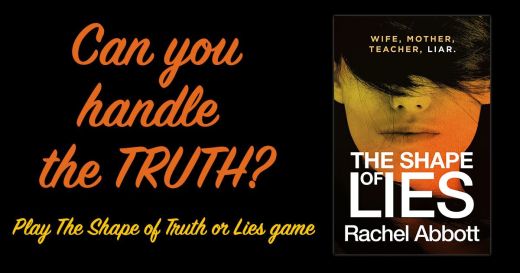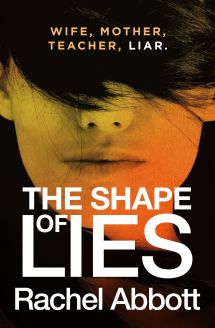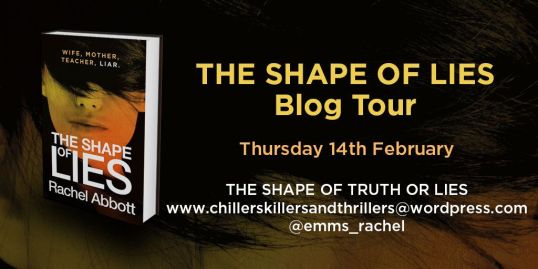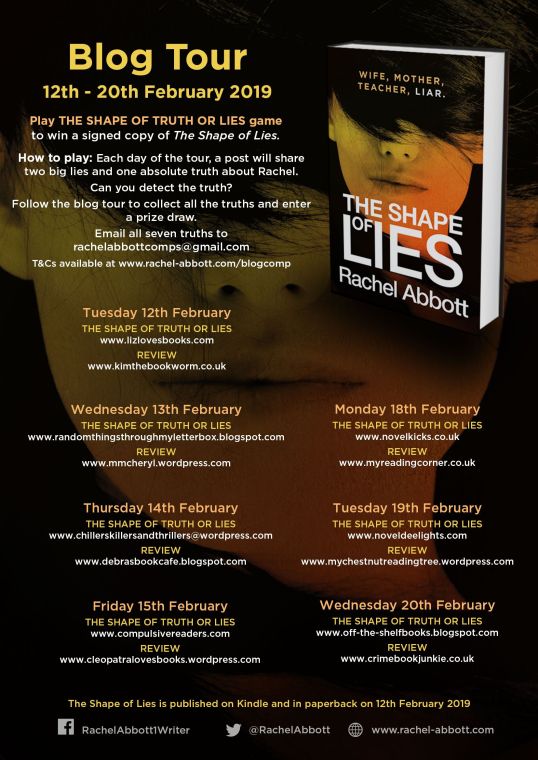Today I’m super excited to be hosting the next stop on Rachel Abbott’s The Shape of Lies blog tour, with clue number 3 in The Shape of Truth or Lies Game. Play along for your chance to win a signed copy of this fab book!

The Blurb:

Yesterday, Scott was dead. Today, he’s back.
And Anna doesn’t believe in ghosts.
Scott was Anna’s boyfriend. She loved him, but he ruined her life. When he died, she should have been free, but today Scott is on the radio, threatening to spill her secrets.
Anna is a mother, a wife, and head teacher of a primary school.
And she’s a good liar.
She made one mistake, and now she is having to pay for it. Scott is the only person who knows the truth about her past, but how can he be alive?
Soon, DCI Tom Douglas is going to knock on her door looking for answers. But Anna is already running scared: from the man she loved; the man she watched die; the man who has come back to life.
She has one week to find him. One week to stop him.
About The Shape of Lies:
This is Abbott’s ninth novel and it follows respectable mother, wife and head teacher, Anna Franklyn, who is driving to work when a voice on her favourite radio phone-in programme shatters every hope that she has escaped her dark past. The caller on ‘The One That Got Away’ claims to be her ex-lover, Scott, and in less than a week, he will expose her truth on air. But how is that possible when Scott is dead?
Meanwhile, Abbott’s much-loved detective, Tom Douglas, needs to find the killer responsible for two brutal murders and unravel Anna’s web of lies to discover what connects her to both bodies.

Now onto The Shape of Truth and Lies Game:
To celebrate the publication of The Shape of Lies Rachel Abbott is playing a game of truth and lies. Play along, follow the blog tour to collect all the truths and you could be in with a chance of winning a signed copy of The Shape of Lies.
How to play:
Rachel Abbott has come up with two big lies and one absolute truth about her life. Can you channel her beloved detective, Tom Douglas, and detect the one truth? Pick carefully, then follow the blog tour to collect all the truths and enter the prize draw. Once you have all seven truths email your answers to rachelabbottcomps@gmail.com.
Full T&Cs can be found here. The next round of The Shape of Truth or Lies continues over on [www.compulsivereaders.com] tomorrow.
Find the one truth and detect the lies:
- I live in a Victorian Fort in the Channel Islands. It housed 55 Germans during the 2nd World War and was also home to seven guns.
- I live in an apartment in a 16thcentury building in France which was used as the location for the prison in the 1975 film version of The Count of Monte Cristo.
- I live in a converted lighthouse in Cornwall, which is the inspiration for my second series of thrillers starring Sergeant Stephanie King.
Which one is truth? A, B or C? Keep your answer safe, collect all seven truths and send all seven to: rachelabbottcomps@gmail.com
Remember to head to www.compulsivereaders.com tomorrow for the next stop of The Shape of Lies blog tour and the next game of The Shape of Truth or Lies.
About the Author:
Rachel Abbott, born and raised in Manchester, founded her own interactive media company in the 1980s, before selling it and retiring in 2005. She then moved to Italy where she worked on the renovation of a 15th century Italian monastery, and it was here that, one day, she found herself snowed in and decided to begin writing for pleasure. This became her debut novel, Only The Innocent, which she went on to publish via Kindle Direct Publishing, topping their chart for 4 weeks. A true self-publishing pioneer, The Shape of Lies is Abbott’s ninth novel. She splits her time between Alderney in the Channel Islands and Italy.
To find out more about Rachel Abbott check out her author links below:















 Matt Johnson served as a soldier and Metropolitan Police officer for 25 years. Blown off his feet at the London Baltic Exchange bombing in 1993, and one of the first police officers on the scene of the 1982 Regent’s Park bombing, Matt was also at the Libyan People’s Bureau shooting in 1984 where he escorted his mortally wounded friend and colleague, Yvonne Fletcher, to hospital. Hidden wounds took their toll. In 1999, Matt was discharged from the police with Post Traumatic Stress Disorder. While undergoing treatment, he was encouraged by his counsellor to write about his career and his experience of murders, shootings and terrorism. One evening, Matt sat at his computer and started to weave these notes into a work of fiction that he described as having a tremendously cathartic effect on his own condition. His bestselling thriller, Wicked Game, which was shortlisted for the CWA John Creasey Dagger, was the result.
Matt Johnson served as a soldier and Metropolitan Police officer for 25 years. Blown off his feet at the London Baltic Exchange bombing in 1993, and one of the first police officers on the scene of the 1982 Regent’s Park bombing, Matt was also at the Libyan People’s Bureau shooting in 1984 where he escorted his mortally wounded friend and colleague, Yvonne Fletcher, to hospital. Hidden wounds took their toll. In 1999, Matt was discharged from the police with Post Traumatic Stress Disorder. While undergoing treatment, he was encouraged by his counsellor to write about his career and his experience of murders, shootings and terrorism. One evening, Matt sat at his computer and started to weave these notes into a work of fiction that he described as having a tremendously cathartic effect on his own condition. His bestselling thriller, Wicked Game, which was shortlisted for the CWA John Creasey Dagger, was the result.









